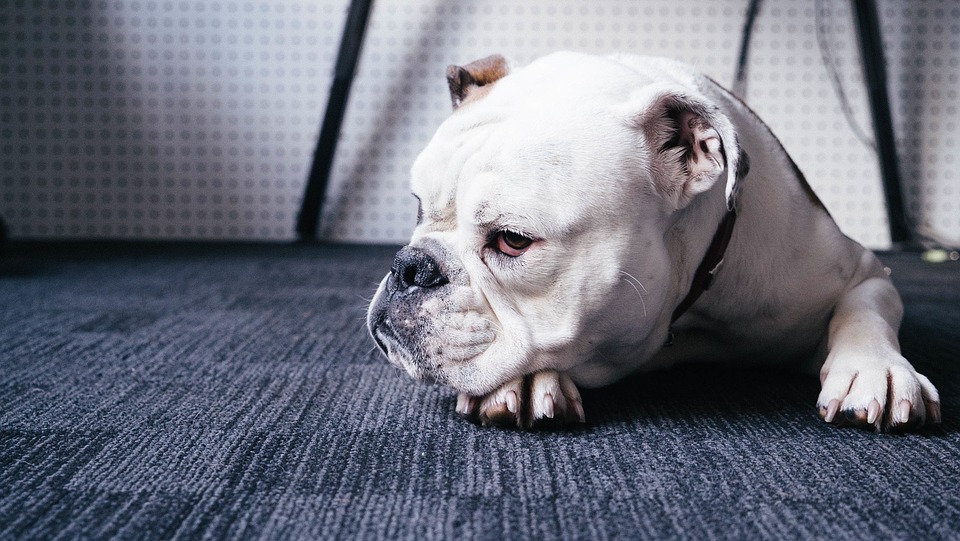Pneumonia in Bulldogs is a very distinct possibility. The disease is particularly common especially during the colder months. Luckily, the prognosis for Bulldogs with the infection is generally good if it is handled properly. This is by no means a rare illness and it afflicts dogs of every breed, Bulldogs included. Read this post to know what to do in case you find yourself confronted with a Bulldog fighting pneumonia.
What is Pneumonia?
Pneumonia in Bulldogs is an illness that affects breathing. That would include the lungs and airways that allow dogs to take in air. This manifests itself with a myriad of symptoms that typically resolve with treatment. However if not treated, it can lead to serious complications in Bulldogs or even death.
Different Kinds Of Pneumonia in Bulldogs
To distinguish between two similar but different medical conditions, bronchopneumonia is a lung swelling and the bronchial passages. Pneumonia on the other hand is an enlargement of the lungs. These terms are often confused.
Bacterial pneumonia, on the other hand, pertains to lung swelling due to a bacterial infection. Aspiration pneumonia is different in that it refers to inflammation caused by inhaled foreign substances. This could include vomit, regurgitated food or fluid. Other than this, the disease also has several other probable causes.
When you see the signs of pneumonia in your Bulldog, you must seek veterinary help right away. Here is what a Bulldog owner should know regarding the symptoms, causes, and remedies for pneumonia in Bulldogs.
How Do Bulldogs Get Pneumonia?
As mentioned earlier, pneumonia is an inflammation of the lung’s air sacs. These air sacs could fill with pus or fluid. Owing to this, difficulty breathing and incessant coughing is associated with the disease.
Lung inflammation is how tissues or cells react to irritation, injury, or pathogens. It is the way a dog naturally reacts to and combats infection. Most cases of pneumonia in Bulldogs are due to a bacterial infection, but there are also other causes.
Viral or Bacterial Causes
Communicable pneumonia is easily the most common type in Bulldogs. A pathogen is a culprit.
Inhalation of a Foreign Substance
Already mentioned earlier, aspiration pneumonia is what happens when a dog inhales a foreign substance into its lungs. Two reasons this commonly happens is if a Bulldog throws up. Another is when they accidentally breathe in liquid medication.
Fungal Infection
This kind is commonly attributable to spores. If this happens, the infection can spread throughout the entire body. This kind of pneumonia typically gets worse over time and is accompanied by cough and mucus that is thick.
Common Signs in Bulldogs
Breathing difficulty
Wheezing or nasal whistling
High body temperature
Nasal discharge
Coughing
Appetite loss
Weight loss
Unusual lethargy
Lethargy
Difficulty exercising
Irregular breathing
Dehydration
Different Symptoms of Aspiration Pneumonia
It is important to note that aspiration pneumonia has many shared symptoms. There are however some distinct symptoms that are unique to it that are:
Difficulty swallowing
Bluish skin
Altered mood
Frequent regurgitation
Other Symptoms
The dog may exhibit an aversion to vigorous physical activity. For example, the dog may not like games they normally like. You might experience rejection, and they may show signs of fatigue.
Bulldogs with severe or advanced pneumonia can struggle to breathe and really suffer quietly. Emergencies of this stage will require strategies to reduce the dog’s anxiety. Reducing the dog’s anxiousness will allow veterinarians to do some evaluation and diagnostics. A dog manifesting these symptoms is already up against pneumonia that can kill. A health professional will need to apply approaches that are more aggressive.

Diagnosing Bulldogs
If your Bulldog is ill, your doctor will begin the diagnosis by going over your dog’s past. After reviewing that and querying you, there is a total body physical exam. The examination will include checking for fever. The vet will also listen to breathing to detect any abnormal breathing sounds.
The veterinarian will also have to order diagnostic and laboratory tests to ascertain what is amiss. These tests will be very thorough to explore every medical possibility. If the veterinarian suspects it, he or she lubricates the trachea. This procedure makes them gather samples and know the specific pathogen that may be responsible for the infection.
Before all these tests, the Bulldog will be placed under sedation and/or given anesthesia for its comfort as well as the doctor’s benefit.
The Various Diagnostic Test for Pneumonia in Bulldogs
X-ray of The Chest
This will show abnormal lung changes. This is extremely helpful to rule out other lung or heart illness.
Cytology
A bronchoscope uses a camera used to see into the inner airways in a drugged Bulldog. After that, samples are gathered for microscopic examination. These are also subjected to tests.
Tracheal Lavage
In this procedure, the Bulldog is usually sedated or anesthetized. Once asleep, a flexible, thin, and catheter is inserted. A little clean liquid is forcefully flushed. After that controlled procedure, the fluid is drawn.
The retrieved fluid that was flushed thus contains can be analyzed for pathogens. The samples can also be examined in the laboratory for further analysis.
Treatment
The strategy for its treatment in Bulldogs could include a potent antibiotic to combat the infection. A veterinarian with results from this could opt to switch the antibiotics. Conversely, fungal pneumonia will naturally need curing.
Trust Your Health Expert
Regardless of the variant, a competent veterinarian will order a cocktail of medications to mitigate the effects of the symptoms. The vet may opt for non-steroidal meds to fight any pain, discomfort, or fever. Medicines for coughing are also usually called upon to help with difficulty breathing. Severe pneumonia cases might require that the Bulldog be admitted to the clinic or hospital for therapy not available at your home. These would include antibiotics given through an IV drip or oxygen support.
Always keep in mind that you should never give your dog over the counter medicines without the go-ahead of your veterinarian. OTC drugs can be bad for Bulldogs. If you have a specific treatment regimen, follow your schedule and dosage instructions meticulously. This to ensure your dog is getting efficacious medicines.

Pneumonia in Bulldog Treatments at Home that is Safe
Under the supervision and guidance of a veterinarian, you can do your share for the welfare and recovery of your Bulldog. These are the following:
Limit the Bulldog’s activity
Making sure the dog gets sleep
Give lots of freshwater to fight dehydration. Water is also an excellent expectorant.
Another helpful remedy is to accompany your dog in the bathroom. Use a warm running shower for a while. Do this a few times a day as a moisture therapy. This procedure can help mucus thin out, and the dog can easily expel or cough it up effortlessly.
Rest for your dog is paramount, but that does not mean it should be totally sedentary. Short doses of exercise can help expel sputum and aid your Bulldog to cough ingested dirt. Just take your cue from the dog and do not force it to be active if it is not in the mood.
Is Pneumonia A Contagious Disease?
Dog influenza is a virus that can transmit to other dogs. Fortunately, there are no documented cases where it has spread to humans. It is caused by a different type of virus, and not the one that causes us to ache and feel feverish. You do not have to worry about contracting the flu from them. The same goes for pneumonia. Similar to influenza, you are not likely to catch pneumonia from your Bulldog.
Still Take Precautions
But be forewarned, pneumonia is transmittable between canines. This is especially so if they are very young, old, or have weak immunity. As a precaution, if you have many dogs (or pets) at home, distance them from your sick Bulldog just to be safe. There have been incidents of sick dogs infecting other animals. Hence, sick Bulldogs should be in isolation, away from other pets in the home.
Other precautions to take are rinsing all dog stuff and paraphernalia. These measures all help avoid contamination. For your own safety always be sure to sanitize after touching your sick pooch. It is also wise to consider wearing a PPE over your regular clothes to help avoid contagion.
Distinguishing Pneumonia from Influenza
Canine influenza signs are akin to pneumonia. This can be a conundrum for diagnosis. They both show the same symptoms. It is hard to distinguish the two at home which is why it is imperative to take the Bulldog to the doctor for an expert evaluation and cure regimen.
Prevent Pneumonia in Bulldogs
There is no guaranteed way to avoid pneumonia. However, there are some measures you can take to lessen the odds. It always helps to keep them in tip-top health. For instance, see the veterinarian routinely. Also, make sure their diet is optimal by feeding them nutritious food. Also, make sure that they get copious activity.
And of course, as mentioned earlier in this post, if you are aware of a sick dog, stay away.
The Wisdom of Pet Insurance
Should your Bulldog be in the doldrums due to an illness like pneumonia, Bulldog pet insurance can help you financially. Good pet insurance can help you focus on providing quality treatment for your pet. You can afford to fuss less about expenses.
What Are the Chances of Bulldogs Recovering Pneumonia?
The odds will rely on the severity of the disease. This means a responsible owner should seek medical help immediately. Complications and severity usually result if there is owner neglect. Another factor that will determine outcomes is the presence of predisposing factors. Is the Bulldog healthy? Is its environment devoid of moisture and damp? Are there other chronic health issues?
In general, the prognosis is upbeat for bacterial pneumonia as long as there are no complicating factors. The prognosis for Bulldogs with predisposing factors, on the other hand, depends on whether the risk factors can be managed by a skilled veterinarian. Not resolving the risk factors will cause the infection to possibly recur. The prognosis for either young puppies or senior Bulldogs, or those with immunodeficiency diseases, is normally fairly optimistic.
In Conclusion
There is no doubt that pneumonia in Bulldogs is a serious matter. The disease if not treated or managed early on can result in quite serious health consequences, even death. This post has hopefully shed some light on the subject, making you a better-informed Bulldog owner. Knowledge, after all, is power, and the more you know, the better for your dog.
The combination of a loving Bulldog owner and a competent veterinarian can surely swing the odds of recovery on the positive side. Pneumonia is not a Bulldog’s death sentence. Just follow the doctor’s orders and your dog will be playfully outdoors again in no time.

